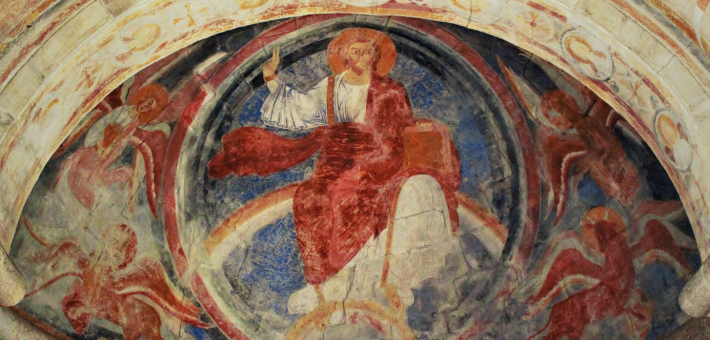Commentary on Psalm 95:1-7a
If you are considering this psalm selection for Christ the King/Reign of Christ Sunday, one of the first decisions you’ll need to make is whether your sermon text will be only verses 1-7a or the entire eleven verses of the canonical psalm.¹
There are good reasons for each option. On the one hand, reading and proclaiming Psalm 95:1-7a as a distinct unit of scripture seems to be consistent with its earliest poetic form and setting as an enthronement psalm. These six and a half verses have a clear literary integrity of their own by virtue of their well-knit structure: verses 1-2 and 6-7 form an obvious and echoing frame of first-person plural call to worship that surrounds verses 3-5 with their third-person description of the Lord’s kingship over and stewardship of creation. Finally, only a few vocabulary words in verses 1-7a overlap with verses 7b-11, the most significant of which are “people” (verses 7 and 11) “come/enter” (verses 6 and 11; same Hebrew verb bo’).
On the other hand, there are also good reasons for treating the eleven verses together, not the least of which is that they obviously form the canonical psalm. This version of it may be confirmed by a fragment from the Dead Sea Scrolls that shows verse 7 with both praise and warning language. Moreover, there are other psalms that combine different genres, such as the preceding Psalm 94 with its community lament and wisdom overtones or Psalm 92, a personal thanksgiving with wisdom imagery. Furthermore, the limited vocabulary overlap noted above nevertheless creates quite a strong contrast of the kind of nation Israel is. Finally, the theology of Christ the King Sunday fits the psalm to a tee, inviting praise for the returning Lord and recognition of his role as the righteous judge.
After wrestling with that decision, I think one historical issue should be addressed, namely, the language about the Lord being greater than “all gods” (verse 3). Worshippers may be unfamiliar with — or disturbed by — the fact that ancient Near Eastern cultures assumed the existence of a collection of greater and lesser deities. The Old Testament historical books testify that Israelites themselves on occasion took part in polytheistic belief and worship. Of course, it’s safe to say that the Old Testament canon represents an “official” rejection of these other gods (Exodus 20:3), even declaring that “they are no gods” (Isaiah 37:19; Jeremiah 5:7). That being said, one can imagine a worship leader of ancient Israel exercising the kind of rhetorical flair in verse 3 to persuade those uncertain of YHWH’s solitary divinity that, at the very least, Israel’s God was superior to all contenders.
I would now like to consider the shared theological framework of Psalm 95 and the other lectionary texts: Ezekiel 34:11-16, 20-24; Ephesians 1:15-23; and Matthew 25:31-46. Although these three other passages don’t contain all of the same literary and thematic elements, one can prepare an effective comparison and contrast of divine imagery of shepherding and judgment. Here I am building on the two specific verbal echoes between Psalm 95:1-7a and 7b-11: the noun, “people” and the verb, “to enter, come in.”
In the first section of the psalm there is reassurance that Israel is indeed “the people of (God’s) pasture” who are called to come and worship God. However, in the second section, Israel becomes “a people whose hearts go astray” and “shall not enter (God’s) rest.” How do the other lectionary passages inform our understanding of this tension between shepherding and judging in order to enhance our proclamation of Psalm 95 as scripture? Each passage makes its own contribution to understanding how the beloved community of worship could become the heart-hardened people who put God to the test.
Ezekiel 34 considers the responsibility of Israel’s failed leadership. The selection of verses does not quite capture the contrast portrayed in the full chapter, but it reflects some of the message that Israel itself is a divided flock because of the false “shepherds,” most likely unjust kings who have used and abused the sheep of God. God, the shepherd, “will judge between the fat sheep and the lean sheep” (verse 20). Consistent with the Old Testament hope for a messianic king, God “will set over them one shepherd, my servant David, and he shall feed them” (verse 23). Although Psalm 95 refers more generally to Israel’s “ancestors” rather than making specific leaders responsible for the wilderness apostasy, some narratives such as Numbers 16 identify individuals who sought to undermine Moses’ authority.
The parable of the “sheep and the goats” in Matthew 25 has obvious parallels to the division of the flock in Ezekiel, but Jesus directs judgment toward “the nations” (verse 32) who did not care for “the least of these who are members of my family” (verse 40). The scene of judgment is now global in scope and those in need are Jesus’ family (“brothers” in the original Greek) who have gone out among the nations. To the extent that the nations received and ministered to the believing community of faith, they are welcomed into eternal life (verse 46). Each generation of human history has its time to respond with open hearts to God’s poor and needy children.
Finally, the prayer in Ephesians 1 seeks God’s grace for the church as the body of Christ to live with wisdom and hopefulness. Two clear allusions to Psalm 95 are the references to the “hearts” of the Ephesian believers being enlightened (verse 18) and Christ’s rule above all “authority, power, and dominion” (verse 21). There is no undertone of the judgment found in the other passages we’ve discussed, but the fact that the apostle is praying for the church to live into their “faith in the Lord Jesus” and “love toward all the saints” (verse 15) implies that diligence is required to be God’s people. The upshot of this tour through these passages is that Psalm 95’s combined themes of worship and warning cannot easily be dismissed as someone else’s concerns. We’re all responsible to answer a call to worship and heed a call for just discipleship.
Notes:
- Originally published on this site on November 26, 2017.



November 26, 2023